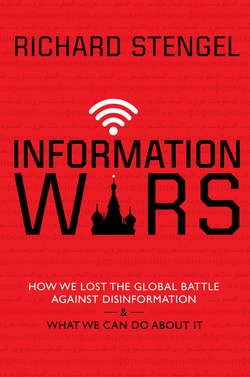Читать книгу Information Wars - Richard Stengel - Страница 20
На сайте Литреса книга снята с продажи.
Luck = Opportunity + Readiness
ОглавлениеIt was 2013, and I was in my seventh year as editor of Time, and I was having lunch with Melody Barnes, the former Obama domestic policy advisor at the White House, with whom I’d become friends over the years. I wanted to know about her post-government life. At the end of the lunch, she turned to me and asked, out of the blue, Would you ever be interested in working at the State Department?
Why do you ask? I said.
She said her good friend was recruiting people to work for Secretary Kerry.
Would there be a particular job that you might want?
The only one I could think of—and knew a little bit about, in part because it had been held by former journalists—was the Under Secretary for Public Diplomacy. She smiled when I said that, and then we said goodbye.
Ten days later I was sitting in Secretary Kerry’s elegant outer office on the seventh floor of the State Department. Unbeknownst to me at the time I had lunch with Melody, the person in the job had just told the Secretary that she would be leaving that summer.
Melody had mentioned our lunch to her friend, a longtime aide to Secretary Kerry, who was then recruiting people from outside the department. She liked the idea; she mentioned it to Kerry, who also liked the idea. I had known Senator Kerry a bit over the years. I had never actually covered him, but I’d been the national editor for Time when he had run for president in 2004. I’d always admired him and hoped that he didn’t remember the story I’d edited about how he’d never win Iowa and never go on to become the Democratic nominee.
I’d always known I’d do some form of public service. In my first summer as editor, I wrote a cover story called “The Case for National Service,” and we published an annual national service issue thereafter. I truly believed in the Framers’ idea of citizen service as a foundation of democracy.
A few days after the lunch with Melody, I got an email from David Wade, Secretary Kerry’s chief of staff, asking me if I was serious. I said I was.
I did a little research about the job. It was created only in 1999, under Bill Clinton, when a bill sponsored by Jesse Helms and Joe Biden abolished the U.S. Information Agency (USIA) and transferred its public diplomacy programs to the State Department to be managed by the newly created Under Secretary at State.1 It hadn’t been an easy change: the USIA people felt that their mission had been devastated, and the State people didn’t love the idea of an information agency at the department. In the 17 years since the job’s creation, it had been empty for as long as it had been filled. The longest-serving Under Secretary had been Karen Hughes, at two years.
After being ushered into Secretary Kerry’s outer office, I sat on the light-blue-and-white-striped chaise on the right, with two chairs in front of it. Kerry bounded into the room with a big smile and a “Great to see you, Rick.” He took one of the chairs in front of the chaise and launched into how important public diplomacy was in the 21st century and how he’d like to reinvent it and I would be the ideal person for the job: I really want your help figuring out what the narrative is for this new century. He’s a terrific salesman. When he finally paused after the tornado of words, I smiled and said, “You had me at ‘hello.’”
I expected him to smile, but he didn’t (perhaps he didn’t know the movie?) and then launched into a second, just-as-enthusiastic round of selling me on the job. In the middle of this second effort, I said, Whoa, Mr. Secretary, I’m going to do it—I’d love to do it. Count me in. Then he leaned back, sighed, and gave me a clap on the shoulder. I saw firsthand what a tenacious negotiator he was. He wouldn’t even take yes for an answer.
